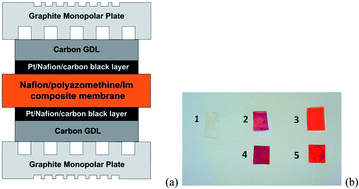当前位置:
X-MOL 学术
›
Sustain. Energy Fuels
›
论文详情
Our official English website, www.x-mol.net, welcomes your
feedback! (Note: you will need to create a separate account there.)
Polyazomethines and their acid–base interactions with Nafion and Nafion–imidazole membranes for efficient fuel cells
Sustainable Energy & Fuels ( IF 5.0 ) Pub Date : 2017-08-22 00:00:00 , DOI: 10.1039/c7se00296c Marek Malinowski 1, 2, 3, 4, 5 , Agnieszka Iwan 4, 6, 7 , Igor Tazbir 1, 2, 3, 4 , Bartosz Boharewicz 1, 2, 3, 4 , Andrzej Sikora 1, 2, 3, 4 , Andrzej Stafiniak 4, 8, 9, 10
Sustainable Energy & Fuels ( IF 5.0 ) Pub Date : 2017-08-22 00:00:00 , DOI: 10.1039/c7se00296c Marek Malinowski 1, 2, 3, 4, 5 , Agnieszka Iwan 4, 6, 7 , Igor Tazbir 1, 2, 3, 4 , Bartosz Boharewicz 1, 2, 3, 4 , Andrzej Sikora 1, 2, 3, 4 , Andrzej Stafiniak 4, 8, 9, 10
Affiliation

|
We propose, for the first time, aromatic polyazomethines applied in polymer electrolyte membrane fuel cells (PEMFC) as tetrafluoroethylene-perfluoro-3,6-dioxa-4-methyl-7-octene-sulfonic acid copolymer (PFSA) membrane modifiers. Two types of polyazomethines were selected to impregnate pristine PFSA membranes; one with bibenzimidazole groups (25Bo-BABPI) and the second with thiophene rings (2252Th-DMB). In addition, these composite membranes were doped using imidazole (Im) to increase the proton conductivity. The success of the impregnation process of all modified membranes has been confirmed based on FTIR spectroscopy. From the water sorption analysis performed, the obtained PFSA composite membranes were found to be thermally stable (TGA, DTG results) and revealed lower dependency on water, which served as an advantage. The typical membranes used were activated in boiling deionized water, then in 3.75% H2O2, and finally in boiling 0.2 M H2SO4. Moreover, both polyazomethines were oxidized with FeCl3 to check their chemical oxidation abilities. Single PEMFCs assembled using polyazomethine composite membranes were characterized by improved performance, increase in the maximum power density by two folds, higher proton conductivity and larger electrochemical surface area of catalyst in comparison to reference samples. The maximum power density of 231 mW cm−2 at the current density of 637 mA cm−2 was detected for PFSA–25Bo-BABPI membrane. In accordance with the experiments carried out, polyazomethines have positive influence on PEMFCs' overall electrochemical properties. All membranes were tested by atomic force microscopy (AFM) and scanning electron microscopy (SEM) with EDX to analyze their morphology.
中文翻译:

聚偶氮甲碱及其与Nafion和Nafion-咪唑膜的酸碱相互作用可形成高效燃料电池
我们首次提出将芳族聚偶氮亚胺作为四氟乙烯-全氟-3,6-二氧杂-4-甲基-7-辛烯-磺酸共聚物(PFSA)膜改性剂应用于聚合物电解质膜燃料电池(PEMFC)。选择两种类型的聚偶氮甲亚胺来浸渍原始的PFSA膜。一个带有联苯并咪唑基团(25Bo-BABPI),另一个带有噻吩环(2252Th-DMB)。另外,使用咪唑(Im)掺杂这些复合膜以增加质子传导性。基于FTIR光谱法已经证实了所有改性膜的浸渍过程的成功。通过进行的吸水分析,发现所获得的PFSA复合膜是热稳定的(TGA,DTG结果)并且显示出对水的较低依赖性,这是有利的。2 O 2,最后沸腾0.2 MH 2 SO 4。此外,两种聚偶氮甲亚胺均被FeCl 3氧化以检查它们的化学氧化能力。与参考样品相比,使用聚偶氮甲碱复合膜组装的单个PEMFC具有以下优势:性能提高,最大功率密度提高了两倍,质子传导率更高,催化剂的电化学表面积更大。的231毫瓦厘米的最大功率密度-2在637毫安厘米的电流密度-2检测出PFSA–25Bo-BABPI膜。根据进行的实验,聚偶氮甲碱对PEMFC的整体电化学性能具有积极影响。所有膜均通过原子力显微镜(AFM)和带有EDX的扫描电子显微镜(SEM)进行测试,以分析其形态。
更新日期:2017-09-06
中文翻译:

聚偶氮甲碱及其与Nafion和Nafion-咪唑膜的酸碱相互作用可形成高效燃料电池
我们首次提出将芳族聚偶氮亚胺作为四氟乙烯-全氟-3,6-二氧杂-4-甲基-7-辛烯-磺酸共聚物(PFSA)膜改性剂应用于聚合物电解质膜燃料电池(PEMFC)。选择两种类型的聚偶氮甲亚胺来浸渍原始的PFSA膜。一个带有联苯并咪唑基团(25Bo-BABPI),另一个带有噻吩环(2252Th-DMB)。另外,使用咪唑(Im)掺杂这些复合膜以增加质子传导性。基于FTIR光谱法已经证实了所有改性膜的浸渍过程的成功。通过进行的吸水分析,发现所获得的PFSA复合膜是热稳定的(TGA,DTG结果)并且显示出对水的较低依赖性,这是有利的。2 O 2,最后沸腾0.2 MH 2 SO 4。此外,两种聚偶氮甲亚胺均被FeCl 3氧化以检查它们的化学氧化能力。与参考样品相比,使用聚偶氮甲碱复合膜组装的单个PEMFC具有以下优势:性能提高,最大功率密度提高了两倍,质子传导率更高,催化剂的电化学表面积更大。的231毫瓦厘米的最大功率密度-2在637毫安厘米的电流密度-2检测出PFSA–25Bo-BABPI膜。根据进行的实验,聚偶氮甲碱对PEMFC的整体电化学性能具有积极影响。所有膜均通过原子力显微镜(AFM)和带有EDX的扫描电子显微镜(SEM)进行测试,以分析其形态。









































 京公网安备 11010802027423号
京公网安备 11010802027423号